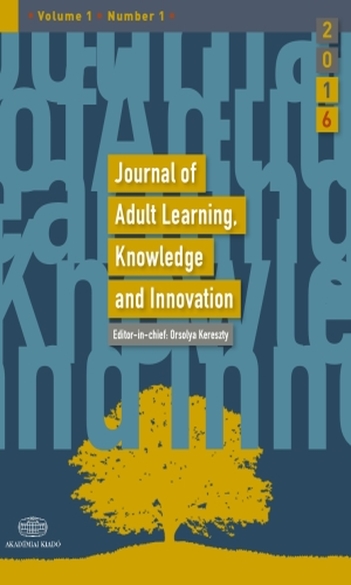The latest issue of JALKI now available online

Virtual exchange during the COVID-19 pandemic, community-based innovation for practicing praxis, honing cooperation skills via portfolio projects and differentiated instruction in EFL classrooms: discover the four topical themes featured in the new issue of JALKI.
Four new articles are available in the latest issue of the Journal of Adult Learning, Knowledge and Innovation (JALKI) focusing on a diverse range of topics connected to adult learning and knowledge construction.
Learning alone together: Emergency-mode educational functions of international virtual exchange in times of the COVID-19 pandemic by Luca Alexa Erdei, Marcin Rojek and Joanna Leek uncovers the characteristics of the special VE actions carried out during the pandemic. The article introduces the term of “emergency mode” virtual exchange programmes and outlines the new directions of VE in terms of educational functions and their prevalence.
Practice of praxis by author Laura Ritchie focuses on learning through collective engagement within the informal setting of a group of creative adults. The study explores an experiential community-based innovation: an online platform called YapNet created to engage with praxis through a self-directed and interdisciplinary network providing feedbacks that facilitate deep learning.
Improving university students' cooperation skills through portfolio projects: A pilot study by Mátyás Bánhegyi and Balázs Fajt reflects on a pilot project introducing the portfolio approach in an ESP course carried out at the Budapest Business School. The paper presents the results of the study on students' initial attitudes towards cooperation with peers and on the reception of cooperation-purpose portfolio tasks while discussing opportunities for improving cooperation skills in ESP classes.
Last but not least, Differentiated instruction in the EFL classroom: An interview study on Hungarian primary and secondary school EFL teachers' views and self-reported practices by Annamária Kótay-Nagy focuses on how Hungarian teachers of English as a foreign language (EFL) view the concept of and practice differentiated instruction (DI). The study explores understandings and attitudes towards DI as well as strategies, challenges and enablers of its implementation.
All of the articles are available open access here: Journal of Adult Learning, Knowledge and Innovation, Volume 6 (2023): Issue 1

